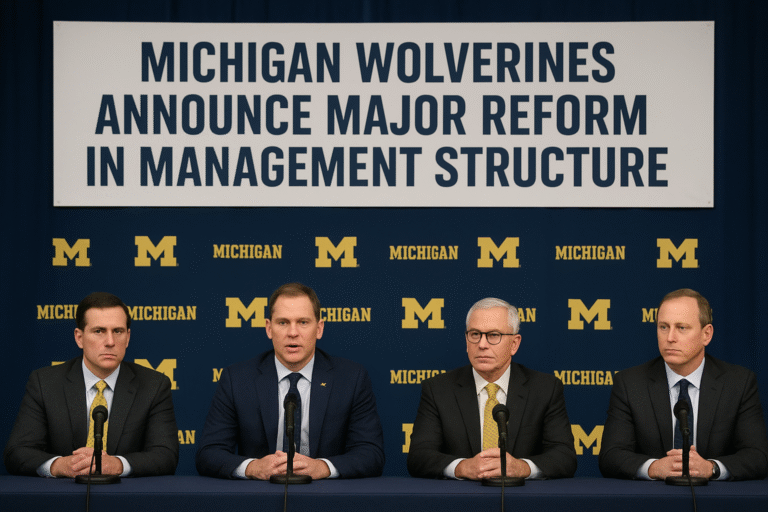Michigan Wolverines Announce Major Reform in Management Structure
In a significant move aimed at revitalizing one of college football’s most storied programs, the University of Michigan Wolverines have announced sweeping reforms to their management structure. The decision, unveiled at a press conference in Ann Arbor on Saturday, marks a bold new era for the program as it seeks to strengthen leadership, enhance player development, and ensure long-term competitiveness both on and off the field.
According to the official statement released by the University’s Athletic Department, the restructuring will focus on “modernizing operations, optimizing staff efficiency, and reinforcing the culture of excellence that defines Michigan football.” The move comes after months of internal review and consultations between the athletic director, coaching staff, and alumni representatives.
“We believe this reform is a necessary evolution for Michigan football,” said Athletic Director Warde Manuel. “Our goal is to ensure that the Wolverines remain a standard of integrity, discipline, and innovation in college sports. The new structure will allow us to better support our coaches, our student-athletes, and our fans who continue to be the heartbeat of this program.”
Under the new plan, the management hierarchy will introduce a Director of Football Operations and Strategy, a newly created position designed to streamline coordination between the athletic department, coaching staff, and recruiting offices. This role will oversee areas such as performance analytics, player welfare, and technological integration — reflecting a growing trend in collegiate athletics toward data-driven decision-making and holistic player support.
Additionally, the Wolverines are set to expand their Player Development Division, emphasizing academic support, mental health, and leadership training. The program will also incorporate a mentorship initiative pairing current players with Michigan alumni, including former NFL stars, to help guide them through the challenges of balancing athletics, academics, and life beyond football.
Head Coach Sherrone Moore, who took over the reins earlier this year, expressed full confidence in the reforms, calling them “a game-changer for Michigan’s future.” He added, “We’re not just building a team — we’re building a culture that prepares young men for success in every aspect of life. This management reform aligns perfectly with our mission to develop champions on the field and in the classroom.”
Longtime Michigan supporters have greeted the announcement with optimism. Many see it as a continuation of the Wolverines’ proud tradition of innovation, leadership, and excellence. Former Michigan quarterback and Heisman Trophy winner Desmond Howard praised the move, saying, “The Wolverines are doing what great programs do — they evolve. College football is changing fast, and Michigan is making sure it stays ahead of the curve.”
The reforms also come at a pivotal moment for the program, as the Wolverines prepare for the upcoming Big Ten season amid increasing competition and evolving NCAA regulations regarding athlete compensation and recruitment. The administration has hinted that the management changes will help the program navigate these new realities more effectively while preserving its core values.
As part of the restructuring, Michigan will implement new communication channels to improve transparency and fan engagement, including monthly updates from the Athletic Department and behind-the-scenes digital content showcasing player progress and team initiatives.
“This is more than a management change — it’s a commitment to excellence,” Manuel emphasized. “Michigan football has always been about leadership, integrity, and passion. With these reforms, we are ensuring that our program not only maintains its rich legacy but continues to set the standard for college sports across the nation.”
As the Wolverines gear up for another highly anticipated season, the message from Ann Arbor is clear: Michigan is not just preparing to win games — it’s preparing to redefine what success in college football truly means.
